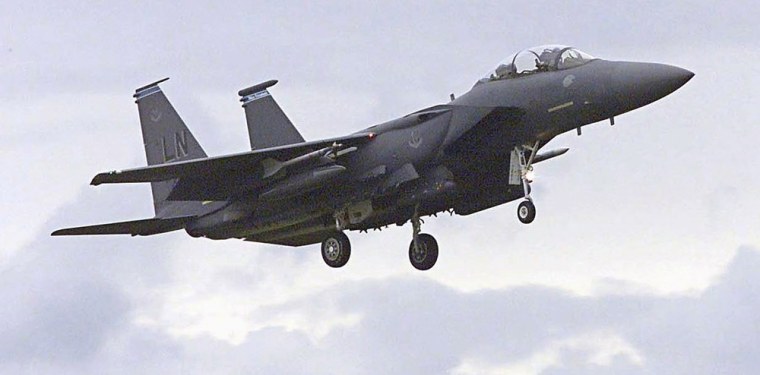The Obama administration will soon notify Congress of an arms package for Saudi Arabia worth up to $60 billion, U.S. officials said Monday, a potentially record-breaking deal that may help counter Iran's growing regional muscle.
The deal would apparently represent the largest single U.S. arms sale ever approved. It would allow Saudi Arabia, the most militarily advanced of the Arab Gulf states and one of the richest countries in the world, to buy top-line U.S.-made helicopters and fighter jets with ranges that would span the Middle East and beyond.
Unlike some previous sales to Saudi Arabia, this one is not expected to be derailed by opposition in Congress or from U.S. backers of Israel, who have worried in the past about blunting Israel's military edge over its Arab neighbors.
Iran is now seen by Israel, the Gulf Arab states and the West as a significant and unpredictable threat that has changed the old calculus of the region's balance of power.
The U.S. is realigning its defense policies in the Gulf as Iran improves the range and accuracy of missiles and other weapons that could threaten Israel or U.S. allies in Europe. Besides the Saudi deal, the U.S. has pending or proposed arms sales to Kuwait, Oman, and the United Arab Emirates, and has repositioned some U.S. forces and military assets around the Gulf.
The Pentagon plans to notify Congress of the proposed Saudi sale within about a week, spokesman Col. David Lapan said Monday. Lapan would not confirm details of the Saudi shopping list pending congressional notification, but two senior defense officials said it includes up to 84 new F-15 fighter jets and three types of helicopters including the sleek Black Hawk and the missile-toting Apache.
"It's massive," said Andrew Exum, an analyst at the Center for a New American Security, calling the long-anticipated deal a "shot-in-the-arm" for the U.S. defense industry.
"What the United States is trying to do here is pretty clear. (It is) basically trying to work by, with, and through our partners in the region to balance against Iran," he said.
The defense officials, who spoke on condition of anonymity because Congress has not yet seen the entire proposal, said the Pentagon expects that Saudi Arabia would initially select about $30 billion worth of aircraft. Approval of the larger proposal would give the kingdom room to buy more warplanes later.
Congress could ask for changes or try to attach strings. U.S. and Israeli officials said they expect some members of Congress will object strongly to the sale, but not enough to block it.
$30 billion in weapons for navy?
Separately, the Pentagon is considering an additional request to sell up to roughly $30 billion in advanced naval technology to Saudi Arabia. The defense officials said that plan was still in the preliminary planning stage and would not come before Congress for months. It could include new patrol ships to defend Saudi coastal waters and counter the growing naval capability of Iran's powerful Revolutionary Guards.
The sales acknowledges the shift in U.S. and Israeli security priorities in the Gulf region, defense analyst Anthony Cordesman wrote recently.
"Strong U.S. security ties to Saudi Arabia offer Israel a far better alternative than Saudi Arabia turning to European or other suppliers and questioning U.S. support if it faces a crisis with Iran," Cordesman wrote in a Center for Strategic and International Studies analysis.
The Obama administration has repeatedly assured Israel that it is committed to protecting the Jewish state's military advantage, said Jonathan Peled, spokesman for the Israeli Embassy in Washington.
"We have had a close, consistent dialogue about it," and Israel accepts the U.S. rationale for the sale "even though we are not thrilled about it," Peled said.
U.S. and other diplomats said Defense Secretary Robert Gates laid out the reasoning behind the proposed Saudi sale during meetings with Israeli Defense Minister Ehud Barak in recent months.
$30 billion in military aid for Israel
Washington plans to counterbalance the sales to Arab nations with $30 billion in military assistance to Israel over 10 years. Israel is buying about 20 advanced American F-35 fighter jets worth $4 billion, to be funded by U.S. military aid to the country.
"At the core of our policy is making sure that there is stability in the region and part of that stability is making sure that Israel has what it needs to be able to provide for its own security," State Department spokesman P.J. Crowley said Monday. "So the United States would do nothing that would upset the current balance in the region."
Exum said the Saudi package had to be viewed in the context of other deals in the region. He cited the expected sale of a missile defense system manufactured by Lockheed Martin Corp to the United Arab Emirates.
If approved, the Saudi deal would provide a huge boost to Boeing's defense unit, which had several key programs axed by Defense Secretary Robert Gates last year.
"This transaction shows that there may still be a lot of life in the F-15 fighter and other Boeing legacy aircraft programs," said defense analyst Loren Thompson of the Virginia-based Lexington Institute.
"The Saudi sale by itself will make a big difference to the company's revenues for at least the next five years," Thompson said.
Upon congressional notification, lawmakers get 30 days to object to the deal. But notifications are usually not sent unless lawmakers have already broadly agreed to the sale.
Saudi Arabia was the biggest buyer of U.S. weapons during a four-year span of 2005 through 2008, with $11.2 billion in deals, according to the U.S. Congressional Research Service.
The Wall Street Journal first reported on the package earlier Monday, saying it would be the largest U.S. arms deal in history and could support as many as 75,000 jobs.
